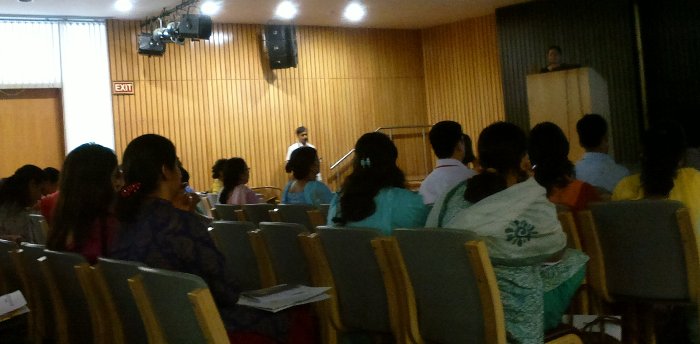CONFERENCE FOR MATH TEACHERS, a report.
CONFERENCE FOR MATH TEACHERS, a report.
PURPOSE: ENABLING MATHEMATICS LEARNING THROUGH TECHNOLOGY
ORGANIZED BY: RAMANUJAN FOUNDATION FOR INITIATIVES IN MATHEMATICSEDUCATION(RFIME)
CHIEF GUEST: SHRI VINEET JOSHI, CHAIRMAN, CBSE
HELD ON: 2 AND 3JULY, 2012
TIMINGS: 8:30AM 4:30PM
VENUE: INDIA INTERNATIONAL CENTRE,NEW DELHI
ATTENDED BY: Ms. ALKA KANWAR AND Ms. SANDHYA BATHEJA from our School.
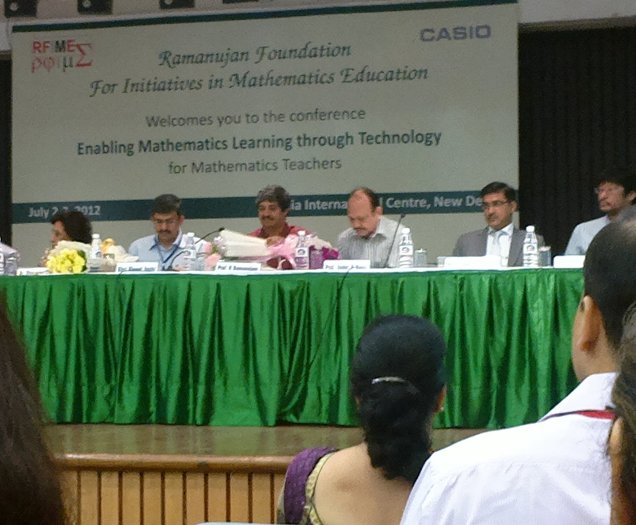
Mathematics has traditionally been perceived as difficult. The primary reason for this state of mathematics learning today is the significant gap between content and pedagogy. In order to bridge this gap it is imperative to bring about a change in the way mathematics is taught -Dr.ShyamaChona
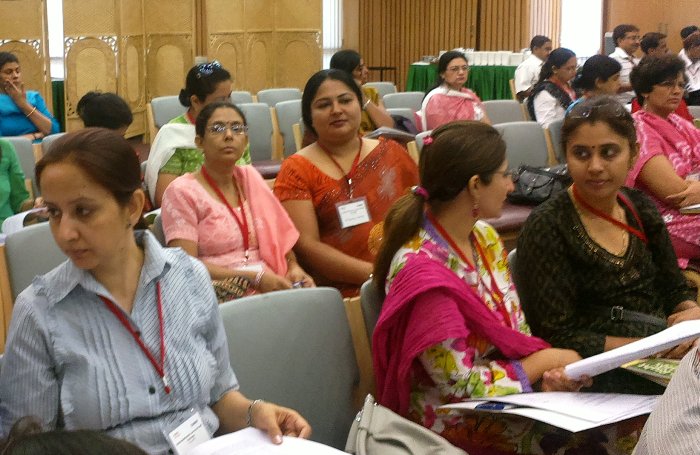
The purpose of RFIME is to reach out to students and teachers of schools across the country with a new paradigm of mathematicseducation, onedriven by innovation, research, multi-dimensional methodology and the use of technology. Keeping this vision in view, a professional developmentprogramme,Enabling Mathematics Learning through Technologywas planned at IIC on 2and 3July, 2012. Theprogrammedeliberated on various issues related to the integration of technology in mathematics instruction and provided participants with a hands-on experience in using technology tools for teaching mathematics.Approximately 150 teachers from middle, secondary and senior secondary levels of several reputed schools of Delhi attended the workshop. Some of the participating schools were Air ForceBalBharti,SanskritiSchool, Banyan Tree, St. Columbus, Hans Raj Model School,The Heritage School,SardarPatel Vidyalaya, Queens Mary School, St. Marys School, Navy Children School, Delhi Police Public School and many branches ofDelhiPublicSchool. Many teachers from Govt. schools and SCERT were also invited to attend the conference.
The resource people were fromeminent mathematics backgrounds and represented highly esteemed institutes of the country. Highlights of their talks are as follows:
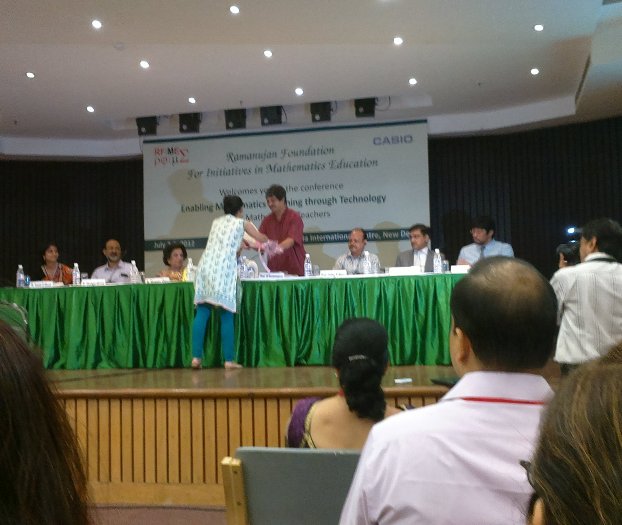
Prof. R.Ramanujam, Institute of Mathematical Sciences, Chennai
Topic: Mapping the school mathematics curriculum
A mathematics curriculum has both a logical structure and a pedagogical structure. Analysis of the first is a mathematical task. Analysis of the second is a task of mathematics education. Performing these tasks separately is like choosing plants for a garden without knowing how theygrow.,then watering them without knowing anything about what flowers and fruits one may expect. We need an analysis of the curriculum that is simultaneously mathematical and pedagogical; this is not only essential but possible as well.
Dr.ShaileshShirali, Director, CommunityMathsCentre,RishiValley School, AP
Topic: Experimentation and discovery in mathematics: The role of Technology
Oneof the peculiarities of mathematics teaching handed down over the generations, is that we teach it in a strictly logical way, ignoring the fact that mathematics was not discovered in quite that way. Thatis ,we tend to teach the subject according to its logical structure. The effect of this is to convey the impression that the subject has no past and that it has existed forever in a perfect, pristine state. This is obviously not true. The actual fact is that all through history, experimentation has been an integral part of the subject, and that it is through such experimentation that we make connections, spot patterns, form conjectures, test them and revise them, and finally provethem(or in some cases prove them to be false)
But if this is the case then why is such a perspective not made a regular part of mathematics pedagogy?
Mathematics, IIT,Mumbai.Prof.InderKRana, Department of
Topic: Mathematics from the Real World- Why and How?
Toooftenmathsis taught on the abstract level of arbitrary numbers with examples that have no connection to the real world. It is a challenge to teach mathematics to the mobile generation. So we should make an effort to bring real life situations to mathematics in the classroom with the help of technology. The tools should be suchthat stimulatemathematical discussions in a small group settings and generates interest in problem solving.
Dr.JonakiBGhosh, RFIME
Topic: a. Visualisingand exploring mathematics using Casio teaching tools
b. LearningMathematics in Secondary School: Some Pedagogical Affordances of Handheld Technology
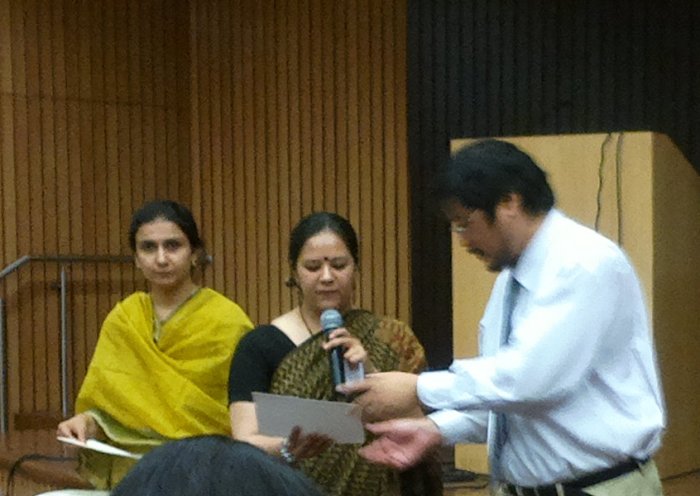
Prof.GeethaVenkatraman, Dean, School of Undergraduate Studies,AmbedkarUniversity
Topic: Apowerpointpresentation onbiography ofSrinivasaRamanujan
Dr.GauravBhatnagar, Sr. Vice President, DIPS,EducompSolutions Limited
Topic :Some lessons fromRamanujansApproach to Mathematics
5Lessons to learn fromRamanujam:
1. Perform numerical calculations to gain insight
2. Follow beauty in mathematical patterns
3. Develop your power to generalize
4. Increase your power to calculate
5. Develop a feeling for form in mathematical structures
Dr.HaneetGandhi, RFIME
Topic: Assessment for the learning of mathematics
Ms.RashmiKathuria, Dept. of Mathematics,KulachiHansrajModel School, New Delhi
Topic: Expanded classroom @ Technology
Ms.SangeetaGulati, Head, Dept. of Mathematics,SanskritiSchool, New Delhi.
Topic:a.Exploringmathematical ideas in a dynamic geometry environment (A hands on workshop session onGeogebra)
b. Online Resources for Mathematics Classroom
Ms.HimaniAsija, Dept. of Mathematics,Delhi PublicSchool,VasantKunj,New Delhi
Topic:Enriching School Mathematics through Project based Learning
After listening to the speakers, we gained a huge advantage on how we canadapt to new technology based teaching-learning scenariosspiteof our hectic schedules. We want to thank our School management for the platform and opportunitywhich we shall long cherish.
As filed byMs. SandhyaBatheja and ms. Alka Kanwar, senior Maths teachers.








